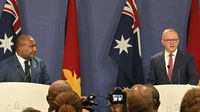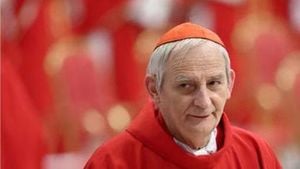Australia's recent federal election has ushered in a new chapter for its relationships with Pacific nations, with key collaborations set to continue under the re-elected Labor government. The election result is seen as a pivotal moment for Australia’s engagement in the Pacific, particularly in areas such as climate change, defense, and labor mobility.
According to Mihai Sora, a former Australian diplomat and director of the Lowy Institute's Pacific Islands Program, the region had a clear preference for continuity in Australia's Pacific policy platform following the election. "It's not necessarily a personal affinity for Labor or for Albanese - it's more Australia's Pacific policy platform," he explained. Sora emphasized that the continuity of government represents continuity in policies that are crucial for Pacific countries.
Labor's victory means that significant collaborations will persist, including a bid to co-host a climate change summit, a defense treaty with Papua New Guinea, and enhanced labor mobility and visa pathways. Prime Minister Anthony Albanese and Foreign Minister Penny Wong have made it clear that they are committed to strengthening ties with Pacific nations through frequent visits and bilateral agreements. Recent treaties with Tuvalu and Nauru exemplify this commitment.
Papua New Guinea's Foreign Minister Justin Tkatchenko expressed support for Labor's re-election, stating, "Why would you want to change something that is working well?" This sentiment reflects a broader confidence among Pacific leaders regarding Australia's direction under the Labor government.
On the campaign trail, Albanese's opponent, Peter Dutton, faced criticism for his past remarks regarding Pacific leaders and climate change. In 2015, Dutton made a controversial comment about rising sea levels, saying, "Time doesn't mean anything when you're about to have water lapping at your door." Palau President Surangel Whipps Jr. took Dutton to task for these comments during a recent visit to Sydney, highlighting the ongoing sensitivity around climate issues in the region.
Looking ahead, Australia's relationship with Papua New Guinea is poised for significant developments. Albanese's close rapport with PNG Prime Minister James Marape, demonstrated during their walk along the Kokoda Track last year, is expected to facilitate a major defense treaty. This treaty aims to allow Papua New Guineans to join Australia's defense forces, marking a substantial elevation in security cooperation between the two nations.
Sora noted, "The one thing that is missing in the two countries' defense or security ties is this mutual security obligation, laid out in a legal way, in an open way, and in a binding way." He anticipates that Australia will seek similar legal frameworks in its recent treaties with Tuvalu and Nauru.
In addition to strengthening ties with Papua New Guinea, Sora indicated that Australia may also seek to enhance its relationships with the Solomon Islands and Vanuatu during Albanese's second term. The Jeremiah Manele-led government in Honiara has shown a willingness to accept Australian assistance in training police officers, despite a growing inclination towards China.
Meanwhile, Australia signed a bilateral security deal with Vanuatu in late 2022, although this agreement has yet to be ratified due to a change in government. The evolving political landscape in the Pacific is crucial for Australia as it navigates its foreign policy priorities.
As of May 7, 2025, federal election results are still being monitored in several undecided seats across the country. In Richmond, New South Wales, Labor candidate Justine Elliot is likely to retain her seat against the Greens, while the Australian Electoral Commission (AEC) is conducting a recount in the Bean electorate due to an incorrect pairing in the final two-candidate preferred count.
In another significant development, New South Wales Police Commissioner Karen Webb announced her retirement, which will take effect on September 30, 2025. Webb, who has been the first female police commissioner, expressed that her role has been her "greatest honor." In her statement, she recommended that Deputy Commissioner Peter Thurtell act in her position, allowing for a smooth transition as the state prepares for an election period.
Labor candidate Sarah Witty has gained a stronger lead over Greens leader Adam Bandt in Melbourne, currently leading with 53.55% of the vote compared to Bandt's 46.45%. This shift reflects the ongoing political dynamics in the region, as voters weigh their options in the wake of the election.
Independent Monique Ryan's lead over Liberal candidate Amelia Hamer in Kooyong has narrowed to just 622 votes, indicating a competitive race as the final counts are tallied. Tim Wilson, a Liberal candidate, has also expressed his support for nuclear power, emphasizing its role in Australia's future industrial development.
Meanwhile, the Smartraveller advisory service has issued warnings for Australians considering travel to Pakistan and India due to security concerns. Travelers are advised to exercise caution and stay updated on local conditions, particularly in areas with heightened risks of civil unrest and terrorism.
As the dust settles from the recent election, the focus now shifts to how the new government will navigate its relationships both domestically and internationally. The commitment to strengthening ties with Pacific nations, while addressing pressing global issues, will be critical for Australia’s leadership role in the region.




